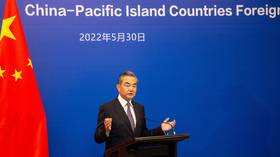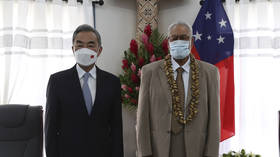No consensus among Pacific islands on Beijing’s offers

Beijing’s efforts to improve economic and security cooperation in the Pacific hit a roadblock after a summit with 10 Pacific island nations in Fiji on Monday failed to reach a consensus. Some of the invited nations have expressed concerns that China’s involvement in the region’s security could lead to geopolitical tensions with the US and its allies.
The meeting came amid a diplomatic tour of the Pacific region by China’s Foreign Minister Wang Yi, which included the Solomon Islands, Kiribati, Samoa, Fiji, Tonga, Vanuatu, Papua New Guinea, Cook Islands, Niue and the Federated States of Micronesia.
The nations held a virtual summit in Fiji where they were set to reach a consensus on a number of wide-ranging deals that would have increased China’s involvement in the security, economy and politics of the region. However, while Samoa and the Solomon Islands had already signed an agreement for closer cooperation with Beijing the day before the summit, other island leaders instead expressed concerns about some of the elements in the proposal.
After the meeting, Wang stated that the nations had agreed on five areas of cooperation and that further discussions were needed to shape more consensus. However, none of the areas he mentioned included security. Instead, they focused on economic recovery after the Covid pandemic and new centers to coordinate agriculture and disasters.
Nevertheless, Wang insisted that Beijing will continue having in-depth discussions and consultations with the region to shape more consensus on cooperation. He also urged those who are concerned with China's activity in the Pacific islands to not be “too anxious,” pointing to the fact that Beijing has supported developing countries around the world for decades, including in Africa, Asia and the Caribbean.
“Don’t be too anxious and don’t be too nervous, because the common development and prosperity of China and all the other developing countries would only mean great harmony, greater justice and greater progress of the whole world,” he said.
Ahead of the summit, Beijing sent the invited nations a draft communique which offered a five-year action plan that included proposals involving policing, cybersecurity, marine mapping, data communication cooperation, and more.
However, that draft prompted opposition from some of the island nations. David Panuelo, president of the Federated States of Micronesia, stated in a letter last week that he would not endorse the plan, warning that it would lead to geopolitical tensions and threaten regional stability.
Panuelo called the proposal “the single most game-changing proposed agreement in the Pacific in any of our lifetimes” and insisted that it “threatens to bring a new Cold War era at best, and a World War at worst.” He argued that China’s offer was “disingenuous” and would “ensure Chinese influence in government” and “economic control” of key industries.
The concerns of the Micronesian president have also been shared by the US and its allies in the region such as Australia, Japan and New Zealand, who have stated that China’s ambitions will only serve to fuel international tensions and that Beijing’s attempts to expand its military presence in the Pacific posed even more of a long-term threat than Russia.
“China is the only country with both the intent to reshape the international order – and, increasingly, the economic, diplomatic, military, and technological power to do it,” said US Secretary of State Antony Blinken on Thursday, adding that “Beijing's vision would move us away from the universal values that have sustained so much of the world’s progress over the past 75 years.”
In response, Beijing has accused the US of spreading disinformation and of attempting to “contain and suppress China’s development and uphold US hegemony.” Chinese Foreign Ministry spokesperson Wang Wenbin stated on Friday that China strongly deplores and rejects Washington’s position and that Blinken’s speech “spreads false information, exaggerates the China threat, interferes in China’s internal affairs, and smears China’s domestic and foreign policies.”













